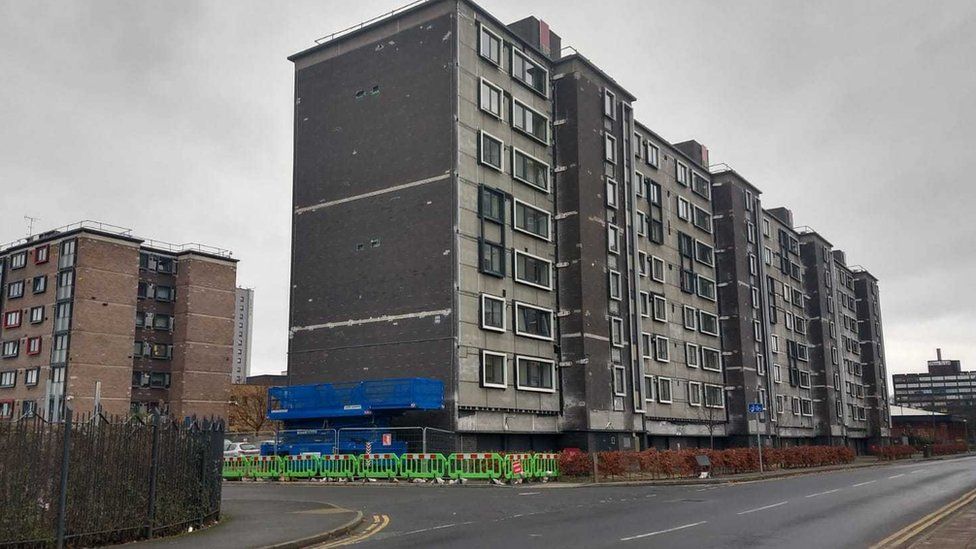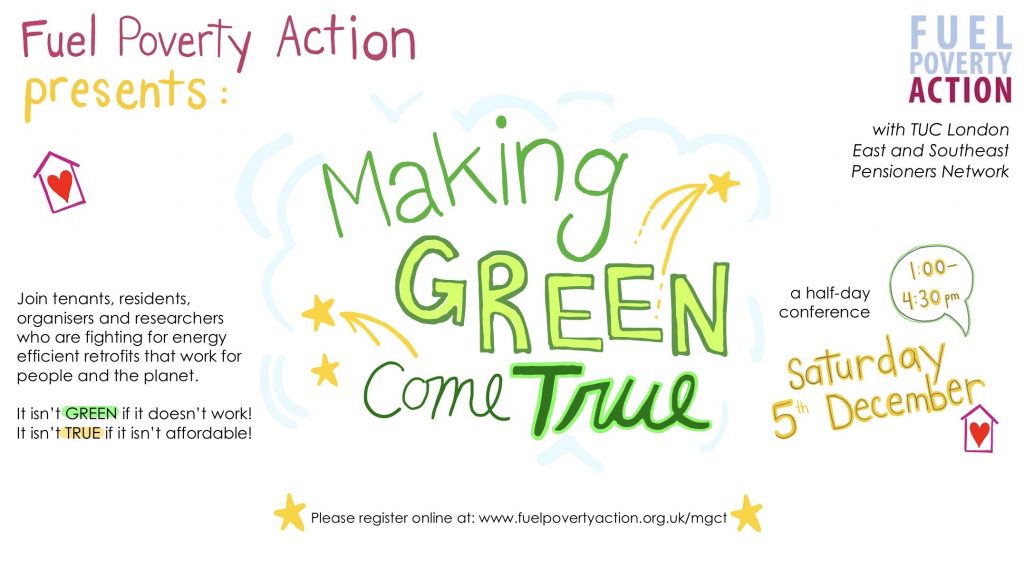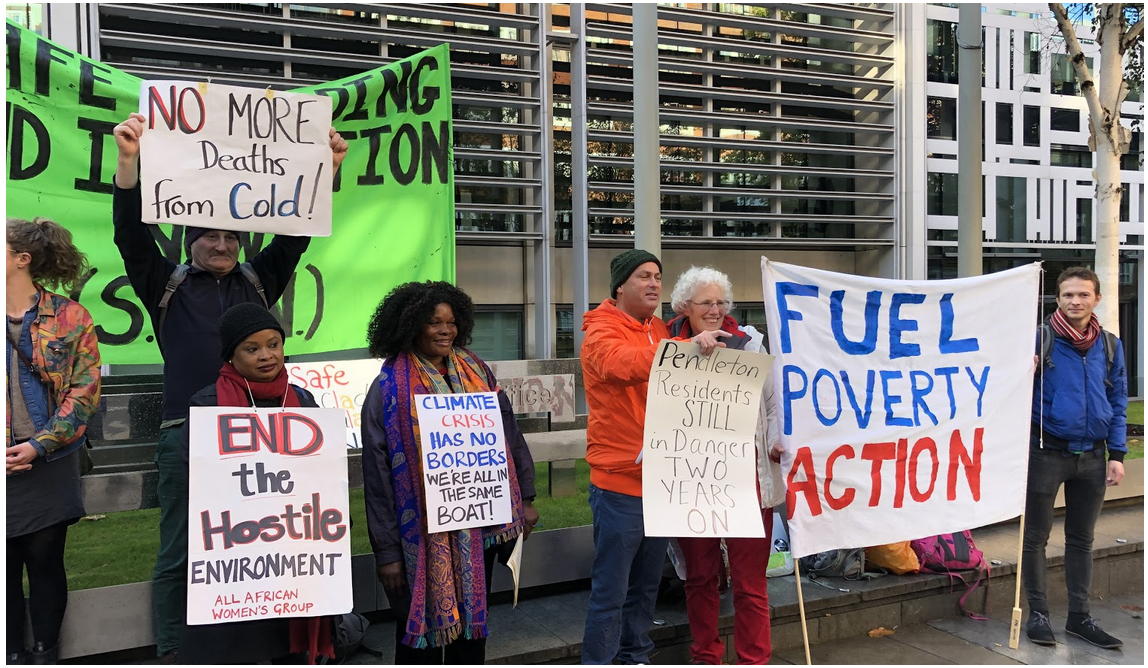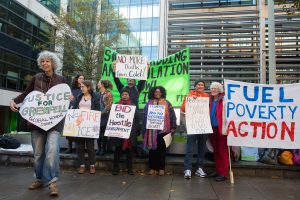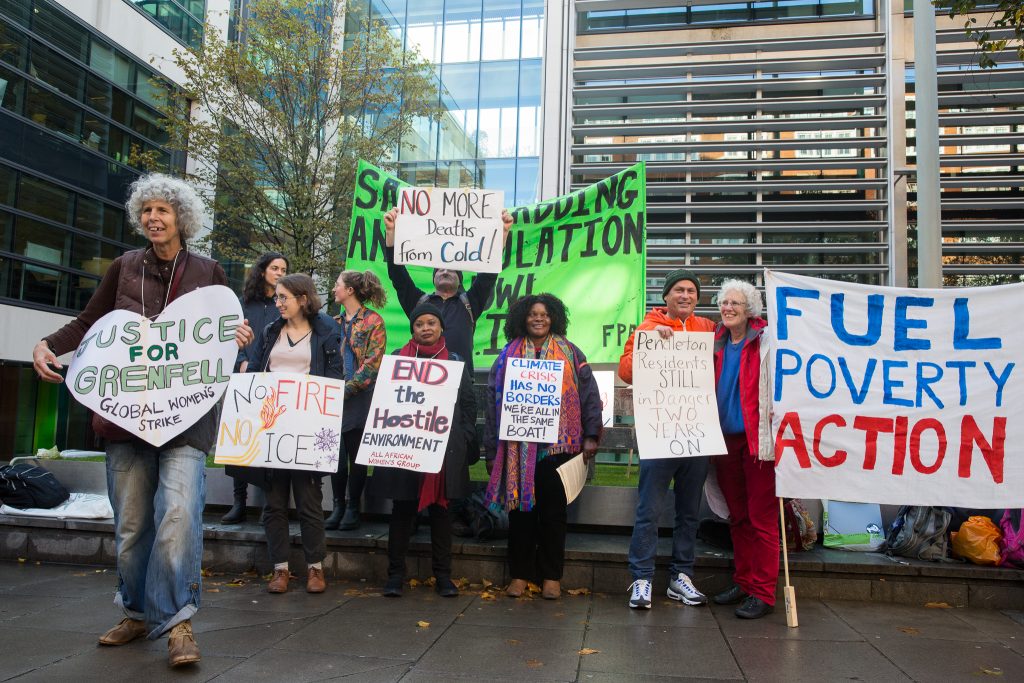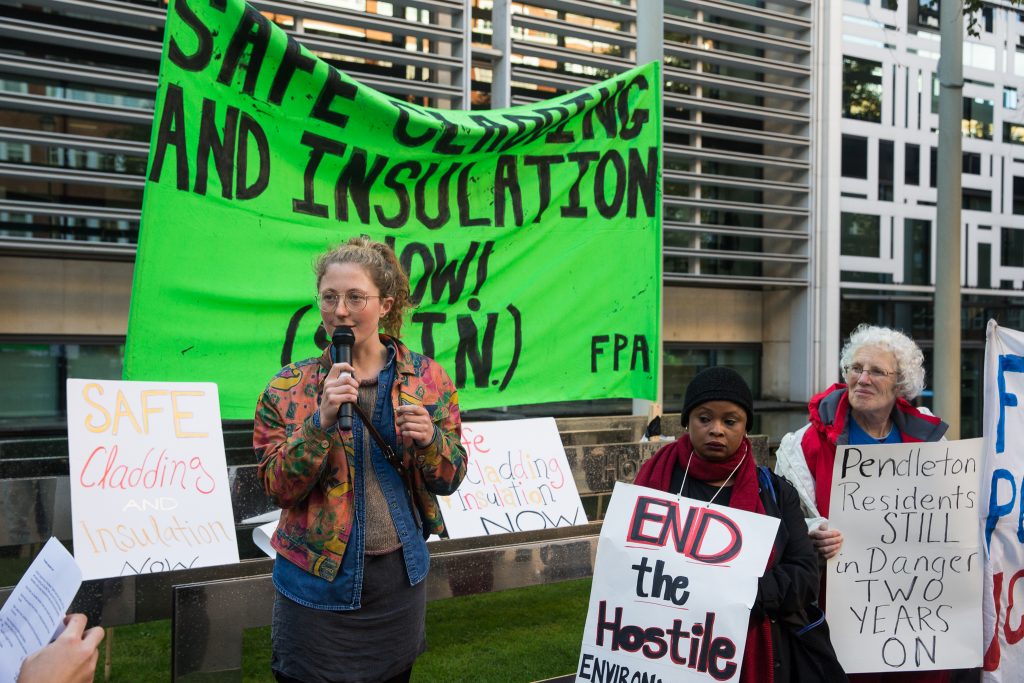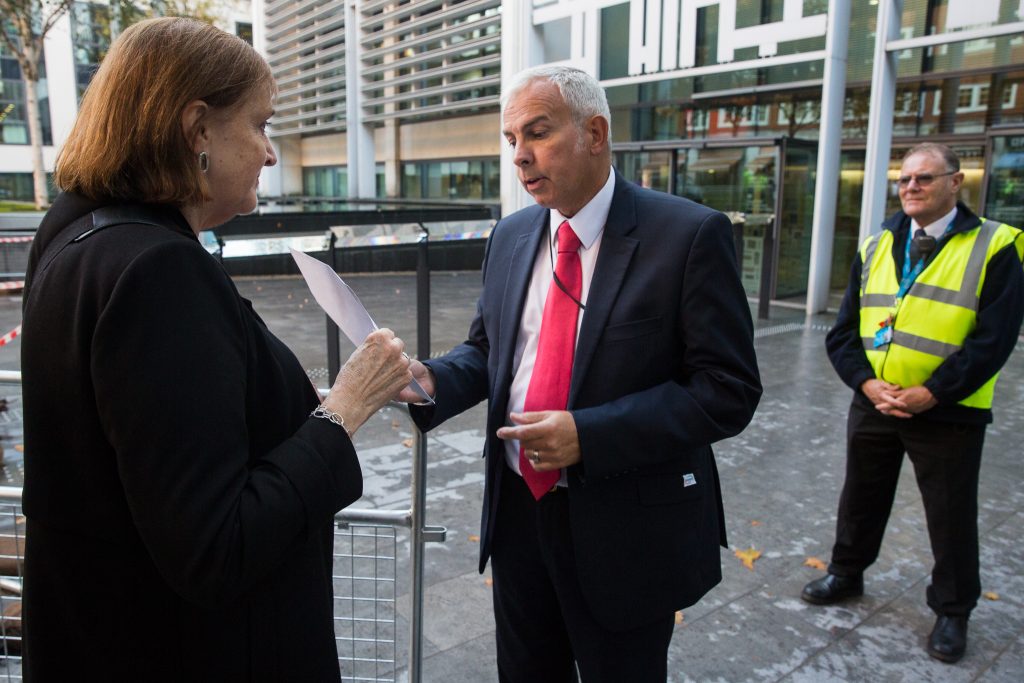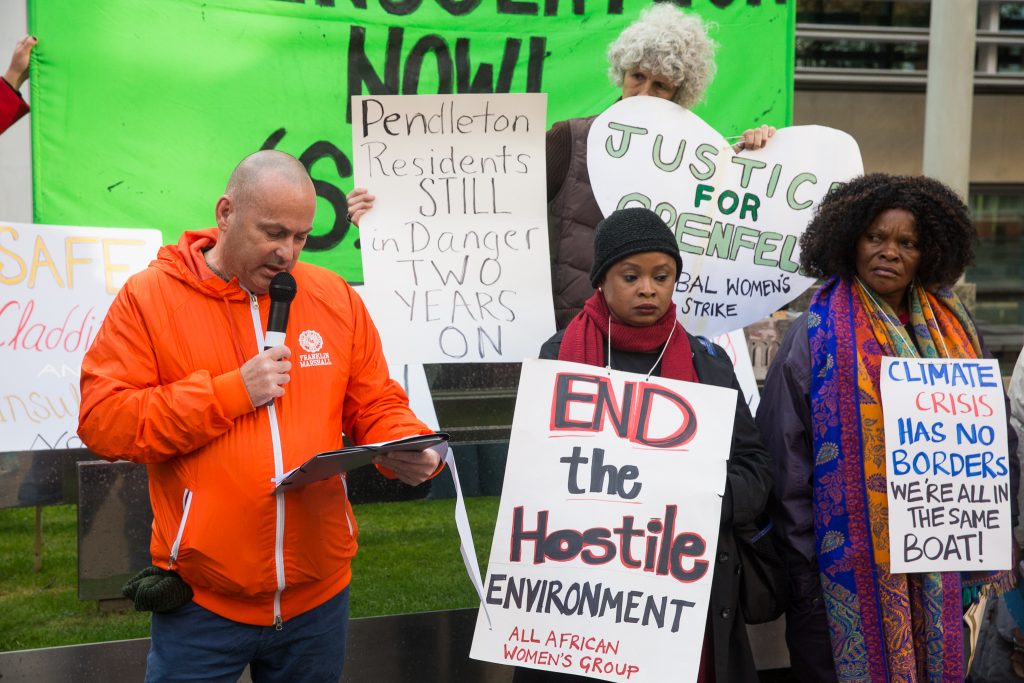Apologies for the length of this update but there is a lot happening. For things you can take part in or take action on please see Building Safety? , Making Green Come True , Cladding finally off — but winter is coming! , and, at the end, “Dictating to the Estate”.
* * * * *
Building Safety?
We want first to draw your attention to an important new initiative by residents groups and campaigners, including Grenfell United, the London Tenants Federation, UK Cladding Action Group and Tower Blocks UK, with the support of the University of Leeds, aiming to influence the government’s proposed reforms to high-rise building and fire safety regulation in the wake of the Grenfell disaster.. The Building Safety Bill is currently in draft form and has just been through a pre-legislative inquiry held by the Housing, Communities and Local Government Select Committee, while the Fire Safety Bill will soon reach the Report Stage in the House of Lords. Related to both are proposed fire safety reforms that have recently been consulted on. There are some encouraging aspects of this reform package, not least the more stringent regulatory enforcement system for high-rise residential buildings under a new Building Safety Regulator with tougher penalties for non-compliance. However, there are many flaws with the Building Safety Bill and the fire safety reforms being laid before parliament:
- The proposed scope of the Building Safety Bill excludes buildings under 18 metres as well as care homes, prisons, detention centres, hospitals, hospices, hotels, hostels, and guest houses despite growing evidence of the fire and structural dangers of such buildings.
- Original proposals for a very strong enforcement system that would prevent new buildings from being occupied unless compliant and allow citizens the right to bring private legal claims for a breach of building regulations have been inexplicably dropped.
- The Draft Building Safety Bill is very vague on how existing buildings will be integrated into the new system
- Despite promising to put residents at the heart of the new system, there are hardly any new rights for residents but a whole load of responsibilities including the requirement that leaseholders will be financially liable for an uncapped Building Safety Charge to pay for safety measures
- The rights of residents to evacuate in the event of a fire are still being ignored: the government is actively undermining the Grenfell Inquiry recommendations to ensure that high-rise buildings are fitted with fire detection and evacuation systems, and that all landlords prepare Personal Emergency Evacuation Plans (PEEPs) to help vulnerable and disabled people and anyone else whose ability to self-evacuate may be compromised.
While consultations have closed (see FPA’s submission on the FSO, based on a campaign template, here) it is still possible to influence the Building Safety Bill and the fire safety reforms — and every closed loophole could save lives. The residents’ initiative will shortly be preparing model letters for people to write to their local MP and councillors to encourage them to put pressure on Ministers and relevant parliamentarians. SCIN will update supporters in due course.
If you are interested in getting involved, please get in touch with Phil Murphy – Phil@ManchesterSustainableCommunities.Com
Making Green Come True — 5 December 2020
We warmly invite you to our half-day online conference, titled Making Green Come True where the proposals now before Parliament will be on the agenda, along with other issues related to both cladding and insulation. The conference will give residents an opportunity to highlight the gap between green promises and reality, share experience, build alliances, and add to pressure for accountability in housing. Beyond the critical issue of flammability it is crucial to make sure that both cladding and insulation are non-toxic, and that they do their job — in many cases inappropriate retrofits have actually left homes colder and damper than before. Plus, the materials they use may be carbon-intensive to extract, produce, and transport, cutting into carbon saving.
There will be a second Making Green Come True event in the new year, focusing on heating. In both sessions will be a mixture of people with direct personal experience and people like architects and renovation specialists who have other kinds of expertise. Campaigners on housing, safety, pensioners’ issues, energy and the climate are welcome, as are trade unionists.
Please register via the link on our website.
Cladding finally off — but winter is coming!
Meanwhile, the fight goes on to get flammable cladding of all sorts off of buildings of all heights. The residents of nine Pendleton Together tower blocks in Salford, have finally had ACM cladding removed from blocks which are a mirror image of Grenfell Tower, and have all the same fire risks too. After three years of sleepless nights it is a huge relief. But residents have had no information on when the cladding will be replaced. And after all this time, the cladding has been removed as we go into winter — and a winter of Covid-19.
Here, as elsewhere, FPA have been raising the issue of how people can keep warm without cladding or insulation. The landlord’s response has been an offer of £25 per month — or 83p per day — for additional heating costs. Experience of other blocks shows that when insulation comes off many people cannot keep warm even if they keep the heating on 24/7 — and who can afford to do that?
In the Pendleton Together flats, there are additional problems with many people’s heating systems — they have NIBE heat pumps which have not functioned properly for years. (we are trying again now to get action on this). Some people say they just never put their heating on. But what will that be like, when the building is open to the elements? Flats on high floors are badly exposed to wind. And other such tower blocks have found that, after cladding removal, there is not only condensation but rain penetration as well.
Please tweet in support of Pendleton residents: “@SalfordCouncil and @salford_mayor, how long are the Pendleton high rise blocks going to be without insulation? It’s getting really cold.” See the Salford Star article!
If you know of other blocks where people have been offered — or NOT offered — compensation for extra heating costs, please get in touch — comparing what is happening in different estates and areas can be crucial to improving what people get.
Tens of thousands still in danger
The government’s Building Safety Programme Monthly Data Release looks only at high rise buildings over 18 metres (6 storeys) high, with Grenfell-style ACM cladding. The records for 30 September 2020 show 456 such buildings identified as unlikely to meet Building Regulations.: The buildings are
- 155 social sector residential,
- 207 Private sector residential,
- 54 Student accommodation blocks
- 30 Hotels and
- 10 Publicly owned buildings.
The startling thing is that these figures are virtually identical with the statistics for September 2019 (An exception is where, in the private sector, more buildings have been identified as unsafe.) Not only has there been no progress during the pandemic — there was hardly any before that, either. In a hard-hitting report The parliamentary Communities and Local Government Select Committee suggest “Any residential building where works have not commenced by December 2020 should be subject to a Compulsory Purchase Order”.
All of these figures are dwarfed by the huge numbers of homes which still have other combustible materials on their external walls, and homes which are in buildings of under 18 metres high. The same parliamentary Committee says says many of these buildings also have further issues like inadequate fire breaks (34%), and combustible or missing insulation (30%).
Written evidence submitted by the National Fire Chiefs Council [CPR 017], May 2020.notes that:
“Several of the worst recent fires in residential blocks have taken place in buildings under 18 metres, such as at the Cube student residence in Bolton. There are estimated to be 100,000 buildings between 11 and 18 meters high.” For a personal account of one such fire see here.
On 11 March 2020 the Chancellor announced in the Budget a £1 billion Building Safety Fund for the removal and replacement of unsafe non-ACM cladding systems in buildings over 18M.. Building owners and managers are struggling to apply for the Building Safety Fund before its tight December deadline, sometimes impeded by the developers. In New Festival Quarter, Tower Hamlets, for instance, the developer Bellway undertook their own survey and (according to the witness report) found missing cavity barriers, combustible insulation and other issues, as well as the ACM cladding now being removed. But Bellway are currently refusing to share their findings with residents – including information important for the funding application
Importantly, a study has highlighted how “Three major house builders have made combined profits of £5.2bn since the Grenfell Tower fire despite leaseholders in properties they developed facing life-changing bills for fire safety repairs”
Residents’ mental health is still in pieces from living in flammable buildings, and many are also paying a high price financially, e.g. for 24-hour fire watch services. The UK Cladding Action Group, with backing from Inside Housing and from Grenfell United, have been working hard to highlight the cost to leaseholders. .
Sadly, the problem is far from solved for social housing tenants, either, and the Parliamentary Committee raised doubts over whether their landlords would have access to the new the new Building Safety Fund. Graeme Langton, a social housing tenant in Salford says,
“I find myself being called on day in and day out to give emotional support to members of my community currently at their wits end. We have seen a vast increase in mental health self referrals – some have been admitted several times during lockdown.
Of course Covid 19 has affected everyone across the country… but here in inner-city Salford many feel that they are not just suffering but are being ignored and left in limbo due to the fiasco led by Salford City Council / Together Housing / and Pendleton Together. Only now after several years of fighting to get the Grenfell style cladding off, is it being removed. But no works plan to replace the cladding and no confirmation as to the quality or standard of what this new material might be.”
A slew of heavyweight organisations have thrown their weight behind the fight, with the End Our Cladding Scandal campaign relaunched in September 2020. But the long and the short of it is that the government has put £1.6bn into removal work but has said this will be the limit of the funding it provides. The full cost of remediating affected buildings around England is estimated at £15bn. The new legislation in the pipeline now is primarily targeted at new builds, not existing buildings. Much will depend on the campaign we flagged up at the start of this Update.
No Justice in Sight
While the fight goes on to prevent more loss of life, Grenfell Tower survivors and their community are battling for justice for those whose lives were ended or turned upside down on 14 June 2017. In the long-delayed public inquiry they have repeatedly been knocked back by being excluded from the room, by the choice of panellists — and months of an empty chair, and by the decision that oral evidence cannot be used in the prosecution of any individual. The fear of seeing those responsible walk away free is very real.
The evidence coming out of the inquiry is damning and heartbreaking. Among much else, it has heard
- That the Tenants Management Organisation, which was inexperienced, poorly performing, and woefully unequipped for its responsibilities with a major refurbishment scheme, discussed with the project’s planners only the “appearance” and the “cost” of ACM cladding – not its safety or efficacy
- That Kensington and Chelsea Tenant Management Organisation (TMO) was aware that the Grenfell Tower had no existing fire strategy in 2012 and called residents who complained about fire safety measures “antagonists”.
- ‘That the Royal Borough of Kensington and Chelsea (RBKC) used “decisive influence” to remove the original contractor on Grenfell Tower despite its claims to have delegated responsibility for the works” putting the council at the heart of cost-cutting decisions: the council’s Laura Johnson “overruled” the TMO and said the council wanted the works re-tendered, which later resulted in the appointment of Rydon on a lower budget, and a cost-cutting exercise that saw metal cladding swapped for combustible plastic-filled panels which fuelled the fire killing 72 people. (Guardian, 6 October 2020🙂
- That, in turn, Rydon knowingly Rydon ‘pocketed’ £126 million in their cost-saving switch to flammable ACM cladding:
- That insulation and cladding manufacturers Arconic, Celotex and Kingspan falsified test results, deliberately misled buyers, and circumvented fire safety regulations to get their products on Grenfell’s walls.
(Yet we are a very long way from seeing anyone in prison for these decisions. And meanwhile, the same practices continue all over the country, including stone-walling and demonising residents who dare to complain.
“Dictating to the Estate”
Very much to the point, then, we’re glad to pass on this message from the team now working on a dynamic expose of what really happened at Grenfell:
“Dictating to the Estate” is a documentary play about events leading up to the Grenfell Tower fire. It uses blog posts, emails and council records to tell the story of the refurbishment of the tower and residents’ attempts to hold the council to account. At the same time, it places these events in the wider context of austerity, social cleansing and deregulation.
Following on from the successful public readings we did last year, the new production will have a new cast and an extensively rewritten script, incorporating information that is currently coming out of the Inquiry. Although it has been delayed a number of times by the pandemic, it will now be coming on stage in November 2021 at the Maxilla Social Club in North Kensington, just a few minutes’ walk from Grenfell Tower. We will also be recording and releasing a free digital performance that people can watch online.
The production is working in partnership with Fuel Poverty Action’s Safe Cladding Now campaign, and will include public talks on issues of fire safety in its satellite events.
We currently have a crowdfunding campaign underway to raise the remaining £13,000 we need to meet our budget. We understand these are particularly difficult times, but any contributions would be greatly appreciated. You can donate to the campaign here: https://www.indiegogo.com/projects/dictating-to-the-estate/x/10245226#/
If you can’t contribute financially, you can still support us by following the production on social media, sharing our posts, and spreading the word. Our handles are:
Twitter: @dtteproduction
Facebook: @grenfelldocumentary
